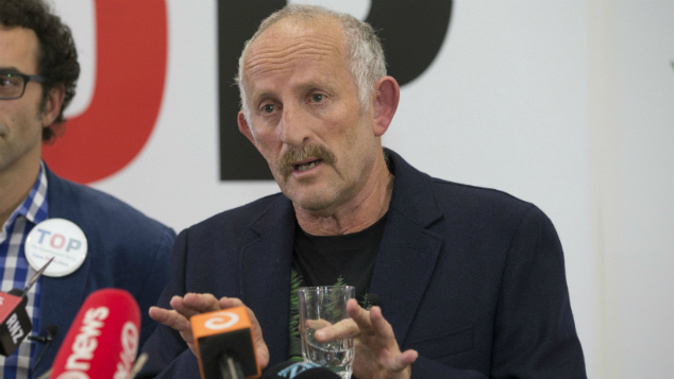
There was always a big problem with The Opportunities Party – no one really knew what it stood for - and no one really knew what type of voters it was appealing to.
Yes, it claimed to exist to promote "evidence-based policies", but to some extent all parties say this and it's simply not a compelling enough reason for voters.
In terms of its target voter, TOP itself didn't seem to know who it was trying to appeal to.
Even founder Gareth Morgan seems to admit today on Twitter that he and deputy leader, Geoff Simmons, differed in who they were focused on: "Geoff's interest was always only in millennials, the children of the urban property-owning elite who hang out at universities.
"Mine is more in working class people who are underpaid while the urban elite is protected from the tax break on income from owner occupied property".
The bigger problem was that many conservatives saw the party as politically "liberal" and many liberals saw the party as "conservative" – partly because it tried to be all things to all people, and hence failed to be anything very clear at all. Or as Liam Hehir puts it, TOP was "Too woke for talkback town, too talkback for woke town" – see: TOP, we hardly knew ye.
Hehir elaborates on this liberal-conservative confusion: "What was TOP's constituency? Where was its power base? It was a populist movement whose leader displayed disdain for the stupidity of common voters. It was an anti-establishment party that was going to rise up against the entrenched way of doing things from its base in, er, bureaucratic Wellington. It railed against personality driven politics while earning free media on the basis of celebrity."
This ideological confusion was there, Hehir says, from its very first day: "The muddled waywardness of TOP was there at its inception. Immediately following his announcement of the party, Morgan compared himself to Donald Trump. Then he took that back and said distanced himself from Trump. Finally, he said he was a bit like Trump. This was all at the same press conference, by the way."
Perhaps the lesson is that TOP was attempting to be a populist party in a country where there is currently little appetite for any sort of anti-Establishment political movement. This is the message of Giovanni Tiso's blog post, Don't let the garage door hit you.
Tiso explains that the modus operandi of Morgan "was to follow the playbook of the likes of Berlusconi, Trump and other contemporary populists. Beginning with chapter one, which instructs to seek controversy, always, in order to monopolise the news cycles and bamboozle the political debate."
However, the problem is those voters who might be interested in such a populist message seem to have departed from active participation in the political system: "the victims of our economic system are also largely excluded from the democratic process: so populists simply have no-one to appeal to – at least no-one who can be relied upon to vote. These are the very same conditions that stand in the way of genuine progressive alternatives."
Credit is given by Tiso for TOP's taxation policies: "TOP was the only party that sought to shift the balance of taxation away from wages and towards capital, including capital tied in real estate. That Labour and the Greens have abandoned any serious attempt to shift this burden – or even admit, in the face of record level of unaffordability, that lower house prices may be a good thing – is one of the New Zealand left's most enduring shames. And if there is a useful challenge to carry forward from TOP's failed experiment, it should probably be this."
Tiso also criticises Morgan for simply not having the patience to progress his policies, which is what is normally required by new political formations. This is also the main point made by blogger No Right Turn, who says "Morgan's biggest problem is that he is impatient" – see: TOP and the politics of impatience.
No Right Turn makes the argument that other small parties like the Greens have played the long-game, and have ultimately been successful in bringing about some major changes. Here's his main point: "Building consensus behind policy and changing political priorities requires time and patience. It requires convincing people. Morgan didn't have patience, either for the process or with the people he was trying to convince. And that is why he was doomed to failure."
Claire Trevett's obituary for TOP makes a similar point, saying the party "stood a chance of getting somewhere had it persisted. It was no mean feat getting to 2.4 per cent less than a year after setting up and in an election in which support for the smaller parties was squeezed by the juggernauts. Parties generally build over time unless there is a lightning rod issue to elevate them" – see: The slow, sad demise of Gareth Morgan's TOP.
Morgan himself is aware of this problem and seems aware of his own impatience, saying, "to change the voting public's political priorities requires a massive investment of time – time that individuals who have other options might more productively apply on other projects" – see his interview with Duncan Greive: 'I enjoyed pissing off the flakes and groupies': Gareth Morgan on TOP, RIP.
The same interview has plenty of other nuggets from Morgan on why the party failed. For example: "Our market research analysis indicates that policy is of minor interest to all but a small subset of the voting public, that in essence there is a massive Establishment party inertia, which in part explains why the policy differences between Labour and National are so minor, even trivial. The way I'd express all that is that the electorate is too fat, content and complacent to respond to radical policy change".
Morgan also explains some of the decision-making that led to him calling it quits, essentially saying that the party failed to find a new leader to replace him. This point is elaborated on by Sean Plunket in an opinion piece yesterday: "Since the election Morgan has attempted in several different ways to transition the party from the perceived rich man's hobby to a more sustainable and less dictatorial organisation.
A new high-profile leader was recruited, and work was proceeding to launch him and TOP.2 early next year. It was that individual's decision to pull out of the role, made for totally justified personal reasons, that was the final nail in TOP's coffin" – see: Is The Opportunities Party over?
Presumably, the new leader who was supposed to take over from Morgan was Lance O'Sullivan.
Plunket also announces that he's very keen to keep TOP going, lamenting that Morgan has unilaterally killed off the party: "If TOP had any semblance of membership-driven authority that wouldn't have been his decision to make alone. Those who were inspired and motivated by the type of politics TOP sought to promote now have a clear choice. They can revert to picking from the established political players and cynically write-off TOP as the cat man's pet project, or pick up the torch and give it another crack."
Deputy leader Geoff Simmons has today published his own account of the party's demise, and also seems interested in keeping the project alive: "A new party was never going to immediately upset the cosy grip of the Labour/National cartel over our parliament like Gareth wanted to. It is pretty clear that was an unrealistic goal, given that two thirds of NZers vote pretty much automatically for the same party every time.
"This is frustrating because those two parties are actually the closest to one another on policy. Breaking this cosy cartel is a very long term game and will probably require some kind of crisis to break established patterns. However, we learned that making an impact and coming close to getting into Parliament is doable. Now we just need to build on that" – see: What I learned from Gareth Morgan and the TOP adventure.
Simmons sees major change is likely to occur in New Zealand politics and society: "Given the global trends, it looks like some sort of policy revolution is inevitable. The current system isn't working. The only question is whether it we can make it a revolution for good, or let it descend into a Trump-style kickback that makes things worse."
There seems to be a consensus that TOP's demise is another warning sign that the New Zealand party system is in danger of getting too small. As No Right Turn says, "it means we'll be down to only 12 registered political parties (and only 5 in Parliament). Which isn't a lot of options for voters to choose from. One way of measuring the health of a democracy is by the number of registered political parties. And on that metric, ours seems to be in slow decline" – see: TOP-less.
This issue is examined in much more detail in Claire Trevett's column (The slow, sad demise of Gareth Morgan's TOP), which outlines all of the other small parties on the "scrap heap".
She laments that New Zealand voters are less interested in ideological diversity: "In New Zealand the diet is more restricted, perhaps by common sense or indifference as much as population size. But the diet is at risk of getting too bland if fringe parties fall by the wayside completely and NZ First or the Greens suffer the same fate as other minor parties have in government. Should the pool of parties shrink further, there will inevitably be calls to revisit the 5 per cent threshold required to get into Parliament."
But perhaps it's simply a problem with "parties set up by moguls", says Peter Dunne, who catalogues all the other parties led by business people that have failed to last, concluding: "The common threads of all these moves are that political parties formed and funded by wealthy business leaders do not last, because those who form them quickly lose enthusiasm for the vehicle they have established and invested so much of their own capital in when they fail to get a sufficient return at the next election. The art of politics is, after all, vastly different from the world of the business takeover, and success in business is no assurance of success in politics" – see: Another National 'mate' burns out.
Some similar points are made by Brigitte Morten, who says that "vanity parties" are inherently unstable and unable to sufficiently incorporate their supporters: "Vanity parties generally start with a bang and fizzle out quickly. This is because there are not solid foundations to the party. A wealthy or charismatic leader starts a party based on their own view of the world, it does not come from a group of people with a shared view of the world. People generally join political parties because they want to be heard, want to have a say on policy and want to have a sense of ownership of making it better.
A party built around a dominant central figure - like Gareth Morgan - fail to provide people in the long term with that ability" – see: TOP demise shows fate of vanity parties.
There is now some attention being focused on what future political parties might arise, and where TOP's supporters might go – see Alex Braae's With TOP gone, where will the protest vote go next?
And some of the existing political parties will be keen on soaking up some of that 2.4 per cent TOP vote – see Sophie Bateman's David Seymour appeals to Opportunities Party voters while holding cats.
Finally, one of the potentially bright lights that has come of the demise of TOP is a new think tank set up by a number of former party candidates, such as Jenny Condie and Jessica Hammond – you can find out more at their Civic website and their Facebook page.
Take your Radio, Podcasts and Music with you









